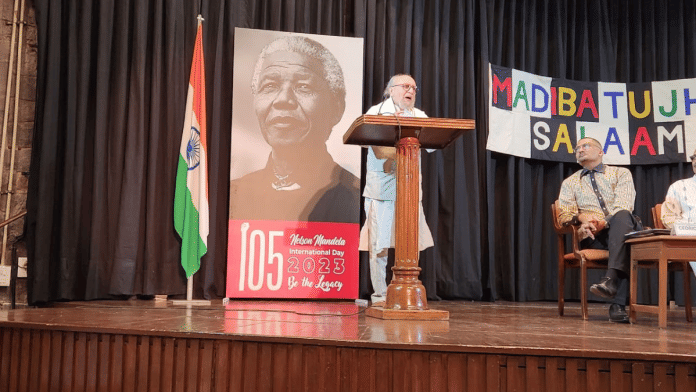New Delhi: It takes a special kind of talent to speak on a provocative topic such as regimes of hatred in New Delhi in the year 2023, and yet manage to avoid mentioning Indian politics altogether.
That is exactly what 86-year-old and much-celebrated political psychologist and social theorist Ashis Nandy did last week.
The occasion was South African icon Nelson Mandela’s 105th birthday memorial lecture, the venue being the India International Centre (IIC). And the talk was titled ‘Regimes of hatred, regimes of conviviality’ — a provocative topic when ‘Desh ke gaddaron ko, goli maron salon ko (Shoot down the nation’s traitors)’ and ‘Nafrat ka bazaar mein mohabbat ki dukan (Counter of love in the bazaar of hatred)’ have been the reigning political calls of the past decade.
Nandy has done groundbreaking scholarship and written dozens of books and essays on Partition violence, State and hate, memory and cinema. As a former head of the Centre for the Study of Developing Societies, he shaped much of critical political and cultural thinking in the 1980s and 1990s. In a controversial article way back, Nandy had even famously psycho-analysed PM Narendra Modi as a “classic, clinical case” of the “authoritarian personality” in the Seminar magazine. This became an analysis for many commentators to invoke for years.
But that bruising description was missing from his speech last week.
In his introductory address, IIC trustee Suhas Borker even offered a readymade set-up line for Nandy about how the subject is particularly important in the times we live in — and an audible collective ‘hmmm’ from the audience followed. Then they waited with bated breath. But throughout his hour-long speech, Nandy didn’t mention any political party or religion or ideology even once.
Also read: Atal Bihari Vajpayee has just been gift-wrapped, returned to the RSS in a new…
Being fashionable, but on eggshells
Hate, Nandy said, is a “very fashionable subject now”, and added that there are a lot of conferences being organised around the world on the topic.
“Mobilising hate has become a game in large parts of the world. There are States which live in a miasma of hate,” he said. “This hate creates fantasies, anger, and plans of revenge. The idea of hate is a complex system. An old saying used to be: Wars make a nation. It can be an indirect way of saying: Hate makes a nation.”
Nandy was visibly and palpably fragile. He began late and blamed his old age for it. Then he tried to read from some pages but neither stuck to the script nor remembered the flow of thought. He would forget some words and take long, meditative pauses mid-sentence. But when he would finally recall the right word, he drew a perfectly straight line from disparate arguments.
Nandy cruised easily from hate to science to Pakistani dictatorships to Vaclav Havel to anarchy.
The talk required him to walk on eggshells, and he avoided any talk about India. But in painting a large global canvas, he touched on all the signposts of contemporary Indian public debate.
Convivial regimes, he said, are States that “allow people to have personal ideologies, and not take up the responsibility of using ideology to define the State”.
Nandy then went on to speak about the second half of the 19th century, the Age of Reason, and the four men of science who changed the way societies thought about things: Charles Darwin, Karl Marx, Albert Einstein, and Sigmund Freud. But the early 20th century was when science was used to justify extermination by classifying people into “worthy and unworthy”.
While science gave the world antibiotics and space travel, people will look back at the 20th century as a period when scientists spouting social evolutionism sent people to gas chambers to die, Nandy said.
For him, the two rulers who epitomised conviviality in the 20th century were Nelson Mandela and Vaclav Havel.
Authoritarians, on the other hand, are suspicious, narcissistic, and “afraid of dissent and rebellion. And in the process, they mess up governance, centralise power and the result is anarchy”.
He said it was difficult to define conviviality and easier to define hate.
But the real clue to the missing piece about Indian politics in Nandy’s carefully constructed speech lay in his disclaimer right at the start. He let the audience into his little mind trick.
Nandy said he had given a public lecture about BR Ambedkar a few years ago.
And he didn’t mention Babasaheb by name even once.
(Edited by Humra Laeeq)






